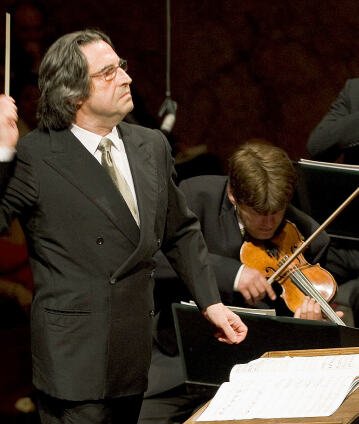The 2009 Europakonzert in Naples

It was after an absence of seventeen years that Riccardo Muti returned to conduct the Berliner Philharmoniker on 1 May 2009. The programme of the Europakonzert that was held in the magnificent setting of the newly restored Teatro di San Carlo in Naples featured Schubert’s Symphony in C major (“Great”), a Verdi overture and Giuseppe Martucci’s song cycle La canzone dei ricordi, a genuine rarity that is all too infrequently heard today.
In Germany, anyone switching on their television sets on 1 May will be familiar with the many wonderful halls in which the Berliner Philharmoniker has given its annual Europakonzert, settings that include the Palazzo Vecchio in Florence, the Escorial in Spain, the Château de Versailles, the Mariinsky Theatre in St Petersburg, St Mary’s Basilica in Krakow and the Vasa Museum in Stockholm, to name but a few of these venues. In 2009 the orchestra visited Naples and performed in the recently renovated Teatro di San Carlo, the oldest opera house in Europe that remains in use to this day, its red and gold opulence and magnificence embodying our ideal image of a theatre auditorium.
As such, it was a worthy setting for the Berliner Philharmoniker’s nineteenth Europakonzert, which once again marked the anniversary of the orchestra’s foundation on 1 May 1882. On the podium was Riccardo Muti, himself a native of Naples. His appearance marked the end of a seventeen-year period of abstinence from the Berliner Philharmoniker. The reunion of orchestra and conductor proved to be a total success, beginning with the opening piece on the programme, the overture to Giuseppe Verdi’s opera La forza del destino, which according to the Berliner Zeitung “drew the audience into its spell with positively addictive force”. The next item on the programme was Giuseppe Martucci’s song cycle La canzone dei ricordi, with which Muti marked the centenary of the death of a composer whose music is now only rarely heard in the concert hall. The brilliant soloist in these melancholically muted atmospheric portraits was Violeta Urmana, a singer with an enviable reputation in Verdi and Wagner.
After the interval came Franz Schubert’s Symphony in C major (“Great”), a work whose “heavenly length” once inspired Robert Schumann. According to the Berliner Morgenpost, Muti conducted it in a way that “went beyond all Romantic insinuations and invested it with a monumental classicism”, while the Tagesspiegel ventured the view that Muti was also making a connection between the work and the Teatro di San Carlo: “This Schubert does indeed sound as if it is coming straight from an Italian opera house. The tutti passages are as massive as marble blocks, the pizzicato writing and rhythmic accompanying figures are as sharp as razor blades, while the woodwind melodies, by contrast, are as heartfelt and beautifully sung as any grand operatic aria.”
© 2009 EuroArts Music International
Categories
Artists
Our recommendations
- Europakonzert 2012 from Vienna with Gustavo Dudamel and Gautier Capuçon
- Simon Rattle conducts the 2015 Europakonzert in Athens
- 1996 Europakonzert from St Petersburg with Claudio Abbado
- Claudio Abbado conducts Beethoven’s Ninth Symphony at the 2000 Europakonzert in Berlin
- Europakonzert from Athens with Simon Rattle and Daniel Barenboim
- 1994 Europakonzert from Meiningen with Claudio Abbado and Daniel Barenboim